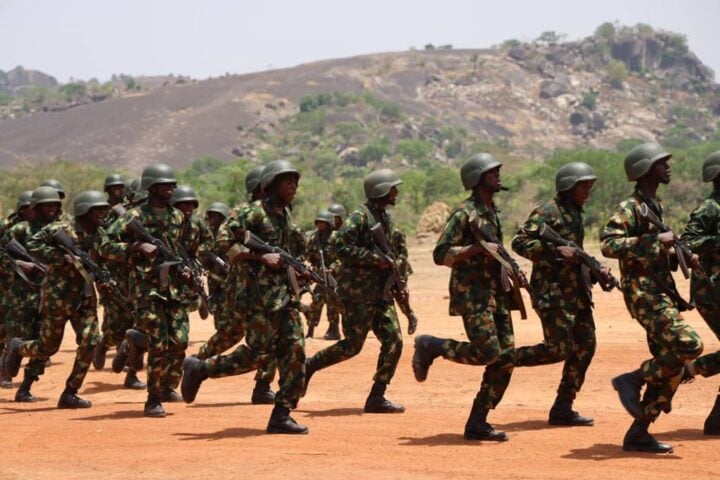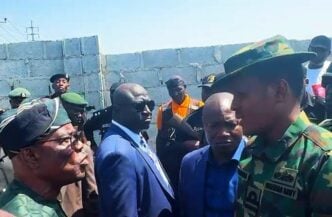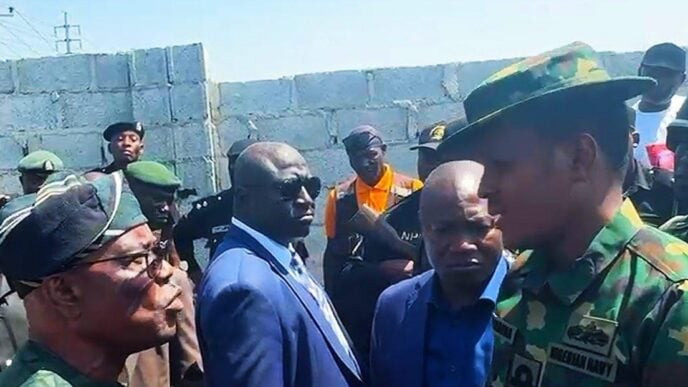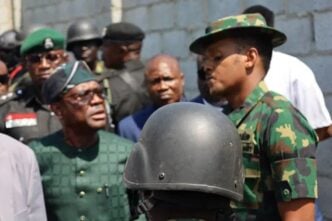File photo of Nigerian soldiers
BY BEULAH ADEOYE
“We once kept the peace of nations. Today, we struggle to keep our own. The question is not what broke us, but when we forgot how to think like ourselves.”
There was a time Nigeria didn’t just talk about peace, we engineered it. From the jungles of Monrovia to the corridors of Pretoria, we were the muscle and the moral compass of Africa. The world once looked to Nigeria not as a warning, but as a weapon, disciplined, decisive, indispensable. That Nigeria, confident, capable, commanding, still exists. She has just forgotten her reflection. In the 1990s, when the world turned away from West Africa’s wars, we stepped in. ECOMOG was more than an acronym; it was an idea: that Africans could save Africa. At our height, Nigeria deployed over 15,000 troops and funded 90% of operations, nearly $8 billion from our own treasury.
Our soldiers waded through the marshes of Liberia and the ruins of Freetown, improvising a new doctrine, “forceful peacekeeping”, that married intelligence with adaptability. They didn’t just fight; they thought. They led. They rebuilt. And when the smoke cleared, even the United Nations took note. “Nigeria deserves our gratitude,” said Kofi Annan, “for saving the lives of thousands.”
Behind every triumph stood an invisible force, the State Security Service, now the DSS, the quiet guardians who turned intelligence into art. They read the whispers, not the headlines. They stopped wars before they began. Their method was not magic; it was mindfulness, human intelligence, human patience, human precision. It was this unseen intellect that kept the nation steady even in its most fragile moments. Nigeria did not endure by accident; she endured by awareness.
We did not merely support the fight against apartheid. We architected it. Nigeria declared itself a frontline state, bankrolling the liberation of South Africa with billions, passports, and training camps. When Nelson Mandela was freed, his first foreign visit was to Nigeria, a thank-you to the nation that had carried another’s freedom as its own. That gesture was not ceremonial. It was the world’s acknowledgement of Nigeria’s moral intelligence, the rare power of conviction guided by strategy.
Advertisement
“The same mind that built peace abroad can rebuild peace at home. It only needs to be reawakened.”
So, what changed? How did the continental sentinel become a domestic struggler? Our problem is not courage. It is coherence. Not strength, but structure. The soldier is still brave. The intelligence officer is still brilliant. But they serve a system that has lost its sense of purpose and its plan. We did not lose our might. We lost our minds, and with it went our might.
Insecurity has become one of Nigeria’s most successful start-ups, a multi-billion-dollar economy of fear that pays better than honesty. For millions of jobless youths, crime is not ideology; it is employment. A rifle pays more than a résumé in many parts – rather sadly. We are not just fighting bandits; we are competing with them for manpower. The force that once dismantled Charles Taylor’s army is now stretched against a thousand micro-insurgencies born from hunger. You cannot shoot poverty. You must outthink it. We do not need to import models this week, so I will not go to Singapore or Rwanda this week. We wrote our own. The levers of recovery are not lost; they are merely rusted, waiting for recall.
Advertisement
Our ECOMOG commanders developed an indigenous theory of stability, intelligence-led, humane, and tactical. Bring them back to Jaji, to Kuru. Let their wisdom define the next generation of officers. The NIA and SSS cannot be everywhere, and the federal police, a colonial relic, cannot protect a federation. Create state and community police who know the terrain, speak the language, and think with the people they protect.
Launch the national security and prosperity initiative, where the army doubles as an engineering corps, rebuilding what it secures. Protect investment, enable jobs, and let work outlast war. Corruption in military welfare is not inefficiency; it is treason in instalments. A soldier cannot fight for a flag that cheats his family. Implement a transparent, digital welfare and procurement system; Botswana proved it can be done.
Scripture gives us two blueprints of victory. Nehemiah, who rebuilt the walls of Jerusalem under siege, sword in one hand, trowel in the other. And Samson, who found the pillars of his enemies’ temple and brought it down in one final act of truth. Nigeria now must be both the builder and the breaker. We must rebuild institutions and break the pillars of corruption that weaken them.
“We are not a weak people. We are a strong nation that has momentarily misplaced its mind.”
Advertisement
To our citizens: stop curating despair. Tell the stories of our strength, of our soldiers in Monrovia, our officers who prevented unseen wars. Demand professionalism, not brutality. To our leaders: restore the covenant between the state and its defenders. Pay them. Equip them. Honour them. To our lawmakers: unbundle the police. This is not politics. It is survival. We are still the nation that stared down apartheid and rebuilt West Africa with our mind, our will, our faith. Those same minds can save us again, if only we remember how to think like ourselves. It is time to fight, not with fear, not with fury, but with thought, courage, and our minds.
Next, I would like to address President Asiwaju Bola Ahmed Tinubu directly. We are not a weak nation, but a disorganised one. Our security apparatus is a collection of powerful, rusted levers, and only the president has the authority to grasp them. The president knows power. The president knows how to use power. The president must now make use of his executive power.
The public is weary of placebos in the name of new “summits”, new “task forces”, new slogans and new vehicles for photo-ops. These are the anaesthesia of a state avoiding surgery. The “Nigerian Solution” is not about what we buy or what we declare; it is about how we fight and how we win. It is about will, command, and intelligence. Accordingly, I have come up with a 4-point blueprint of decisive, presidential executive actions, not five-year plans or legislative requests, but 100-day mandates to reclaim our national security.
1. The 24-hour mandate: Requiring the president to forge the intelligence arrowhead. The president, by executive order, creates a single “National Intelligence Fusion Cell” (NIFC) within the Office of the National Security Adviser (ONSA). This cell will not be led by a general, but by Nigeria’s best civilian forensic analyst, whose responsibility is to initiate action based on facts drawn from data and intelligence.
We do not lack intelligence; we lack shared intelligence. Our SSS has a proud history of deep, human-led analysis, but its product is famously hoarded. The DIA, NIA, and DSS reportedly operate as rival silos. The president is the only individual who can break this. This order will mandate that the DSS, military, police, and financial intelligence unit (NFIU) send all raw, unsanitised data on banditry and terrorism to this single cell. The NIFC’s job is not to guard information, but to fuse it into a single, predictive, daily brief for one person: the supreme theatre commander. This is how we move from being reactive to being predictive.
Advertisement
2. The 7-day mandate: Requiring the president to appoint a true ECOMOG-style commander, thereby consolidating all military operations in the north-west and north-central under a single, supreme theatre commander. Our ECOMOG legacy was built by brilliant, versatile generals who understood asymmetric, intelligence-led warfare. We are currently fighting a 21st-century economic insurgency with a 20th-century conventional war doctrine, spread across multiple, uncoordinated “operations.”
This new commander, preferably a decorated veteran of our ECOMOG or Darfur campaigns, must be given a mandate that transcends just “killing bandits”. His primary task is the systemic dismantling of the bandit economy — their supply lines, their fuel dumps, their informants, and their financial networks, all fed by the new NIFC. He will have total authority over all military and police assets in that theatre, ending the disastrous inter-service rivalries.
Advertisement
3. The 30-day mandate: Requiring the president to launch the “Peace & Prosperity Corps (PPC)”. The president will use his executive authority to create a rapid-development agency, the PPC, modelled on the successful (if controversial) PTF. Considering that insecurity in the north-west is a career path. We must make peace more profitable.
The PPC’s mandate is simple: it follows the army. When the supreme theatre commander clears an LGA, the PPC moves in within 72 hours, not to hold meetings, but to build. With a dedicated, fast-disbursing presidential fund, they will rebuild the local government secretariat, the primary school, the clinic, and the market road. This makes the government’s presence tangible. It gives the local populace an immediate, visible economic stake in rejecting the bandits, restoring the social contract one community at a time.
Advertisement
4. The 60-day mandate: Requiring the president to win the “War for Trust” by signing an executive order to centralise and digitise all troop welfare, insurance, and critical procurement, with a public-facing audit. This must be on an emergency timeline. Our soldiers are lions, but they are being betrayed by a corrupt and broken logistics chain. This order does two things: In terms of morale, it immediately announces a 200% increase in the “death-in-service” insurance payout, guaranteeing that any soldier who falls that their family is secure. This is a non-negotiable, immediate purchase of morale.
Secondly, it provides accountability by requesting a 90-day forensic audit of the entire security procurement system, moving it to a new, digitally transparent e-procurement portal. This sends an unmistakable message to the troops that the president is fighting for them and an equally clear threat to the corrupt establishment that is undermining the war effort. This review should be led by civil society organisations reporting directly to the president.
Advertisement
These four actions — fusion, command, rebuilding, and trust — are the “Nigerian Solution”. They are decisive, executive, and built on our known, proven capacities. They require no new laws, only a new and ruthless political will.
Beulah Adeoye is a legal and financial expert with international recognition for his work in forensic accounting, governance, and philanthropy.
Views expressed by contributors are strictly personal and not of TheCable.










